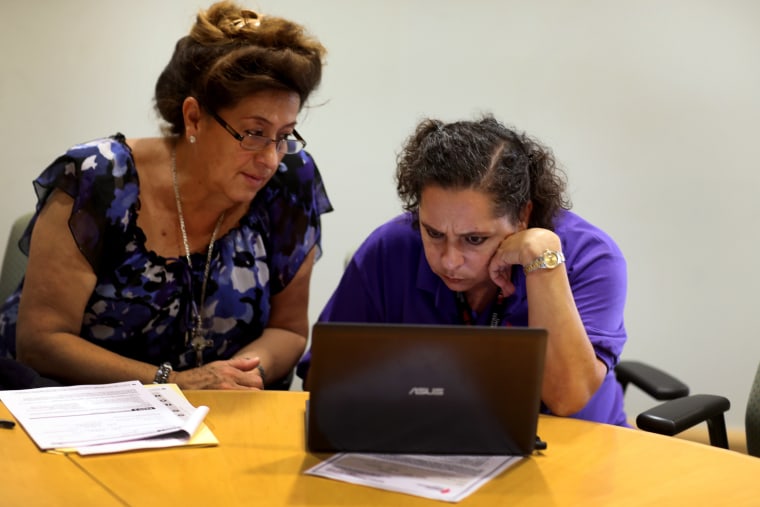It's been 10 days since Americans could start signing up for health care coverage through the Affordable Care Act's exchange marketplaces, and as you've probably heard, there have been some technical troubles. And while I don't doubt it's been incredibly frustrating for those who've struggled with online glitches, let's not forget that we've seen troubles like this before.
Twelve days after Medicare Part D became the law of the land in 2006, the system was "plagued by problems" and "many of the most vulnerable elderly and disabled patients" were unable to get medicine. Several states were forced to pay for temporary supplies of medicine for Medicare patients because the Bush/Cheney administration was falling short on a systemic level.
The same year, Mitt Romney's health care reforms in Massachusetts -- which later served as the blueprint for the Affordable Care Act -- started out with all kinds of problems. Stephanie Mencimer reported this week that in the early months, the state system saw "lost paperwork, computer glitches, confusion over who was eligible for what, and not enough staff to handle the workload." It led to consumers waiting "several months after submitting an application to finally get coverage."
In other words, "Obamacare" is in good company. In time, the kinks plaguing Medicare and Romneycare got worked out and the public was quite pleased with the results, and chances are pretty good that the Affordable Care Act will follow a similar trajectory. Impatience, whether it's politically motivated or not, is understandable, but judging a new and complex system after 10 days has never been an especially good idea.
What's more, let's also not forget that the negative experiences are not universal.
Robyn J. Skrebes of Minneapolis said she was able to sign up for health insurance in about two hours on Monday using the Web site of the state-run insurance exchange in Minnesota, known as MNsure. Ms. Skrebes, who is 32 and uninsured, said she had selected a policy costing $179 a month, before tax credit subsidies, and also had obtained Medicaid coverage for her 2-year-old daughter, Emma."I am thrilled," Ms. Skrebes said, referring to her policy. "It's affordable, good coverage. And the Web site of the Minnesota exchange was pretty simple to use, pretty straightforward. The language was really clear."
Why was her experience so much easier? It wasn't just luck.
The original plan for the Affordable Care Act to rely on state-based exchanges -- rather than have one big federal marketplace, Obamacare intended for states to set up their own exchanges, invite insurers to compete, and trouble-shoot as necessary.
Many states did exactly that, but a variety Republican governors balked -- to set up a marketplace for consumers, they said, would be to cooperate with a law they didn't like. It meant a sweeping federally run exchange for everyone in those states.
It's created disparate experiences based on where Americans live.
In Washington State, the state-run exchange had a rocky start on Oct. 1, but managed to turn things around quickly by adjusting certain parameters on its Web site to alleviate bottlenecks. By Monday, more than 9,400 people had signed up for coverage. The Washington Health Benefit Exchange does not require users to create an account before browsing plans."The site is up and running smoothly," said Michael Marchand, a spokesman for the Washington exchange. "We're seeing a lot of use, a lot of people coming to the Web site. If anything, I think it's increasing."Other states reporting a steady stream of enrollments in recent days include California, Connecticut, Kentucky and Rhode Island.
Some states are having more success than others -- as Sarah Kliff explained, ease of use and online registrations matter. But I can't help but wonder how much easier the last 10 days would have been if more Republican governors weren't intent on keeping their constituents from signing up for the health care benefits they're entitled to?
